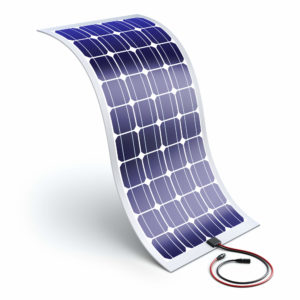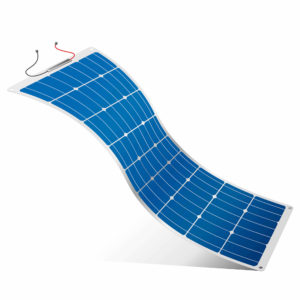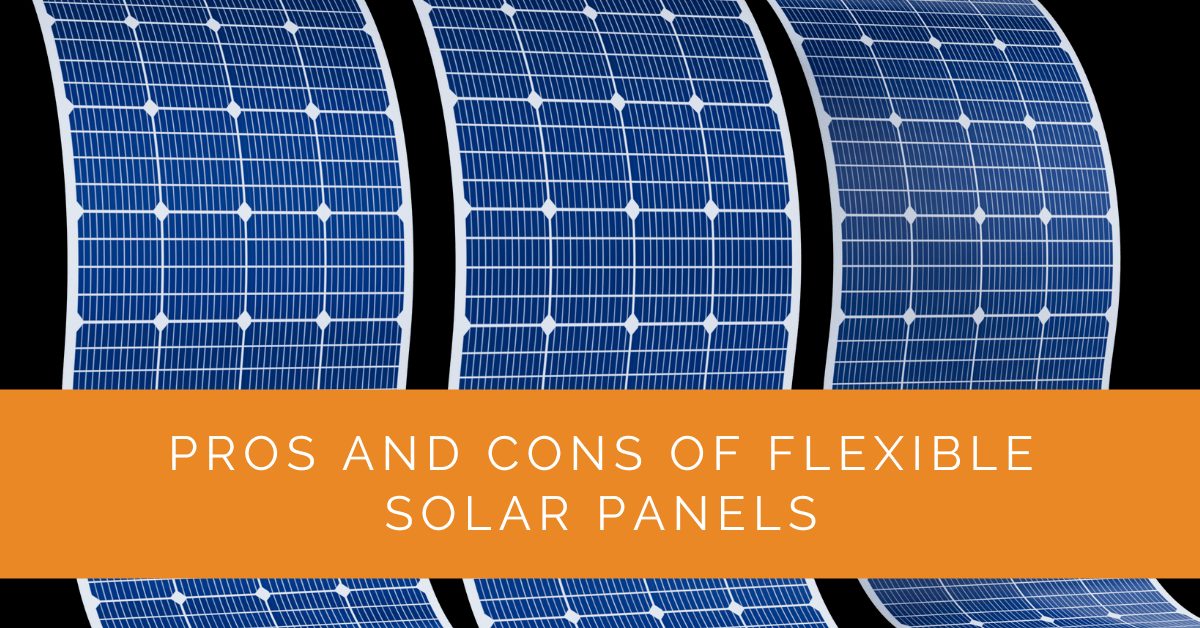In today’s world, harnessing the sun’s power through solar panels has become an increasingly popular means of generating clean and sustainable energy. Among the wide array of solar panel options available, flexible solar panels have garnered significant attention due to their unique characteristics. This guide will delve into the pros and cons of flexible solar panels, comparing them extensively with their rigid counterparts. By the end of this article, you will be equipped with a thorough understanding of the key factors to consider when making an informed decision about your solar energy needs.
Contents
- 1 Key Takeaways
- 2 Pros of Flexible Solar Panels
- 3 Cons of Flexible Solar Panels
- 4 Flexible Solar Panels vs. Rigid Solar Panels
- 5 Flexible Solar Panel Needs Calculator
- 6 Installation Tips
- 7 Types of Solar Panels
- 8 Solar Panel Kits
- 9 Case Study: Implementing Flexible Solar Panels for Versatile Energy Solutions
- 10 Expert Insights From Our Solar Panel Installers About Flexible Solar Panels
- 11 Experience Solar Excellence with Us!
- 12 Conclusion
Key Takeaways
- Flexible solar panels offer lightweight, portable, and versatile solutions, making them ideal for various applications, from camping trips to irregular surfaces.
- Despite their advantages, flexible panels have drawbacks, including lower efficiency, shorter lifespan, limited power capacity, and higher initial costs.
- The choice between flexible and rigid panels should be based on individual needs and circumstances, and it’s essential to explore different types of panels and consider solar panel kits for a well-informed decision in the world of solar energy.
Pros of Flexible Solar Panels
Flexible solar panels offer a range of advantages that make them an attractive choice for various applications. Let’s dive deeper into these benefits:
Lightweight and Portable
One of the standout features of flexible solar panels is their remarkable lightweight nature. These panels are incredibly easy to transport and install, making them an ideal choice for portable energy solutions. Whether you’re planning an adventurous camping trip, setting sail on a boat, or exploring remote locations, the lightweight design of flexible solar panels simplifies your energy needs.
Moreover, the flexibility of these panels allows them to be adapted to various surfaces, including curved roofs or irregularly shaped structures. This versatility extends their utility beyond residential to commercial installations, where rigid panels might pose significant installation challenges.
Durability and Resistance
Durability is a key factor to consider when investing in solar panels. Flexible solar panels shine in this regard, as they exhibit impressive resistance to environmental factors that can jeopardize the longevity of traditional rigid panels. Hail, strong winds, temperature fluctuations, and other harsh weather conditions pose minimal threats to flexible panels, ensuring a more extended and reliable lifespan.
Thin-Film Technology
The technology behind flexible solar panels, known as thin-film technology, is a game-changer in the world of solar power generation. Unlike traditional solar cells, which require direct and intense sunlight to function optimally, thin-film solar panels offer superior performance in low-light conditions. This means that flexible panels continue to generate electricity efficiently even on cloudy or overcast days.
Furthermore, the efficiency of thin-film technology has steadily improved over the years, making flexible panels increasingly competitive in energy production. Their ability to capture sunlight efficiently, even when the sun is not at its zenith, sets them apart as a reliable and productive solar energy solution.
Installation and Aesthetics
The ease of installation is another significant advantage of flexible solar panels. They require fewer mounting accessories than rigid panels, which reduces installation time and costs. Additionally, the flexibility of these panels simplifies the installation process, allowing them to conform to the shape of the surface on which they are mounted.
Beyond their practicality, flexible solar panels also excel in terms of aesthetics. Their low profile and adaptability make them an attractive option for those who want a solar energy solution that seamlessly integrates with the visual appeal of their property. Minimizing the visual impact of solar panels can be particularly important in residential areas where preserving the aesthetics of the surroundings is paramount.

Cons of Flexible Solar Panels
While flexible solar panels offer numerous advantages, it’s crucial to recognize their limitations as well. Let’s delve into some of the drawbacks associated with these panels:
Lower Efficiency
One of the most significant drawbacks of flexible solar panels is their lower efficiency when compared to traditional rigid panels. Rigid panels, especially those equipped with monocrystalline cells, tend to have higher efficiency levels. This means that rigid panels can generate more power in the same amount of space than their flexible counterparts.
The lower efficiency of flexible panels may not be a critical concern for all users. Still, it is a factor that can impact energy production and the amount of space required for installation. Rigid panels may offer a more practical solution for those with limited roof or surface area.
Lifespan and Warranty
Another consideration when choosing flexible solar panels is their lifespan. Traditional solar panels often boast a longer lifespan, sometimes spanning several decades. In contrast, flexible panels may have a relatively shorter lifespan, typically falling within 10 to 20 years. It’s essential to inquire about the warranty of your flexible panels, as this can vary among manufacturers.
To maximize the longevity of your flexible solar panels, adhering to recommended maintenance practices and regularly inspecting their condition is crucial.
Limited Capacity
Flexible solar panels may not be suitable for applications with high power demands. Due to their design and construction, they inherently have limited capacity for power generation. Rigid panels may be a more suitable choice if you have a substantial energy requirement, such as powering an entire household or a large commercial facility.
It’s essential to evaluate your energy needs carefully when considering flexible panels and determine whether their capacity aligns with your requirements.
Cost
While the long-term benefits of flexible solar panels can outweigh the initial investment, it’s important to acknowledge their higher upfront cost than rigid panels. The cost of flexible panels can be influenced by factors such as the brand, quality, and efficiency. Therefore, conducting a thorough cost-benefit analysis is crucial to determine whether the initial investment aligns with your budget and long-term energy goals.

Flexible Solar Panels vs. Rigid Solar Panels
To make an informed decision between flexible and rigid solar panels, weighing the pros and cons of each based on your specific needs and circumstances is essential. Here, we provide a comprehensive comparison:
Advantages of Flexible Solar Panels
- Lightweight and Portable
- Versatile and Adaptable
- Durability and Resistance
- Thin-Film Technology
- Installation and Aesthetics
Advantages of Rigid Solar Panels
- Higher Efficiency
- Longer Lifespan
- Greater Capacity for Power Generation
- Cost-Efficiency for Larger Installations
Your unique situation should guide your choice between flexible and rigid panels. For instance, flexible panels are highly advantageous in scenarios where portability, versatility, and resistance to damage are essential. On the other hand, rigid panels excel in efficiency, longevity, and capacity, making them more suitable for large-scale projects with high energy demands.
Flexible Solar Panel Needs Calculator
Estimate how many flexible solar panels you need for your RV, boat, or off-grid setup.
This tool provides an approximate guide for flexible solar panel needs. For precise system design, consult a solar professional.
Installation Tips
If you decide to go with flexible solar panels, here are some installation tips to ensure optimal performance and longevity:
- Choose the Right Location: Select a location with maximum sun exposure to maximize energy production.
- Angle Adjustment: Adjust the angle of the panels to capture sunlight effectively throughout the day.
- Regular Cleaning: Keep the panels clean to prevent dust and dirt from reducing efficiency.
- Check the Warranty: Familiarize yourself with the warranty terms and conditions to ensure you can address any potential issues promptly.
Types of Solar Panels
In addition to flexible and rigid panels, various types of solar panels are available in the market. These include monocrystalline, polycrystalline, and thin-film panels, each with advantages and disadvantages. Exploring these options is essential to find the best fit for your specific solar technology needs.
Monocrystalline Solar Panels
Monocrystalline panels are known for their high efficiency and space-saving design. They are an excellent choice when space is limited and you want to maximize power output.
Polycrystalline Solar Panels
Polycrystalline panels offer a cost-effective solution with moderate efficiency. They are suitable for those looking to balance performance with affordability.
Thin-Film Solar Panels
As discussed earlier, thin-film panels are highly flexible and perform well in low-light conditions. They are ideal for applications where adaptability and portability are essential.
Solar Panel Kits
Solar panel kits have gained popularity as convenient, all-in-one solutions for those transitioning to solar energy. These kits often include flexible panels, mounting hardware, inverters, and other components necessary for a complete solar power system. Exploring solar panel kits can simplify your journey towards solar energy and provide a cost-effective solution, especially for beginners.
Case Study: Implementing Flexible Solar Panels for Versatile Energy Solutions
Background
Solar Panels Network USA is dedicated to delivering innovative and sustainable solar energy solutions across diverse applications. Our expertise in installing both flexible and rigid solar panels allows us to cater to the unique needs of our clients. In this case study, we highlight the implementation of flexible solar panels for a client requiring a versatile and portable energy solution.
Project Overview
The client, an avid camper and boat owner, sought a solar energy system that could be easily transported and adapted to different surfaces. The primary requirement was for a lightweight, durable, and efficient energy solution capable of powering various devices during camping trips and boat excursions.
Implementation
After evaluating the client’s needs, we recommended the installation of flexible solar panels due to their lightweight and adaptable nature. We selected high-quality thin-film flexible solar panels known for their superior performance in low-light conditions and resilience against environmental factors.
The installation process was straightforward. We mounted the flexible panels on the client’s boat using minimal mounting accessories, ensuring they conformed to the curved surface without compromising efficiency. Additionally, we provided portable setups for camping, allowing the client to easily transport and deploy the panels in different locations.
Results
The flexible solar panels exceeded the client’s expectations in terms of performance and versatility. The panels consistently generated sufficient power to run essential devices, even on overcast days, thanks to the improved efficiency of the thin-film technology. The client appreciated the durability of the panels, which withstood strong winds and occasional hail during their adventures.
Moreover, the ease of installation and low profile of the flexible panels significantly enhanced the aesthetic appeal of the installations, both on the boat and at various camping sites. The client reported a noticeable reduction in reliance on traditional power sources, leading to cost savings and a more sustainable lifestyle.
Summary
Our experience with flexible solar panels in this project underscores their practical advantages for clients seeking portable and adaptable energy solutions. The lightweight design, durability, and improved low-light performance of flexible panels make them an excellent choice for diverse applications, from recreational activities to residential installations. At Solar Panels Network USA, we continue to leverage such advanced technologies to meet and exceed our clients’ renewable energy needs.
Expert Insights From Our Solar Panel Installers About Flexible Solar Panels
Flexible solar panels are a fantastic option for those needing a lightweight and portable energy solution. Their adaptability makes them ideal for a variety of surfaces and applications.
Senior Solar Installer
One of the key advantages of flexible solar panels is their durability. They can withstand harsh weather conditions, making them a reliable choice for environments where traditional rigid panels might fail.
Lead Solar Technician
Although flexible solar panels have a slightly lower efficiency compared to rigid panels, their ease of installation and aesthetic appeal often outweigh this drawback for many users.
Solar Installation Manager
Experience Solar Excellence with Us!
Trust in Solar Panels Network USA, where our seasoned experts deliver top-quality solar solutions for homes and businesses nationwide. With a legacy of countless successful installations and a commitment to sustainable energy, we’re your reliable partner in the solar journey. Ready for a brighter, eco-friendly future? Call us now at (855) 427-0058 and harness the power of the sun!
Conclusion
Flexible solar panels present many advantages, including their lightweight nature, versatility, durability, and ease of installation. These features make them a compelling choice for various applications, from portable setups to curved roofs and irregular surfaces. However, it’s essential to consider their limitations, such as lower efficiency, a relatively shorter lifespan, limited capacity, and higher upfront costs.
The choice between flexible and rigid solar panels ultimately depends on your unique circumstances and energy requirements. While flexible panels excel in specific scenarios, rigid panels offer higher efficiency, longer lifespans, and greater power-generating capacity. Therefore, conducting a thorough assessment of your needs and goals is crucial to making the right choice.
Furthermore, exploring various types of solar panels, including monocrystalline, polycrystalline, and thin-film options, allows you to tailor your solar energy solution to your specific preferences.
Finally, the availability of solar panel kits simplifies transitioning to solar energy, providing a convenient and cost-effective solution for both beginners and experienced solar enthusiasts.
About the Author
Solar Panels Network USA stands at the forefront of solar energy solutions, driven by a team of seasoned solar engineers and energy consultants. With over decades of experience in delivering high-quality solar installations and maintenance, we are committed to promoting sustainable energy through customer-centric, tailored solutions. Our articles reflect this commitment, crafted collaboratively by experts to provide accurate, up-to-date insights into solar technology, ensuring our readers are well-informed and empowered in their solar energy decisions.

